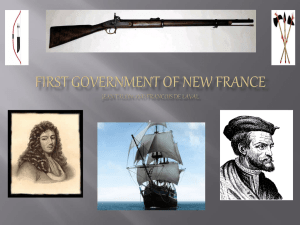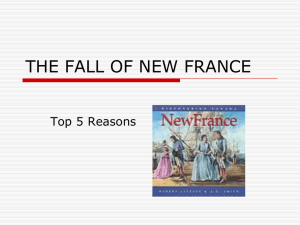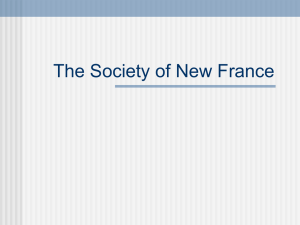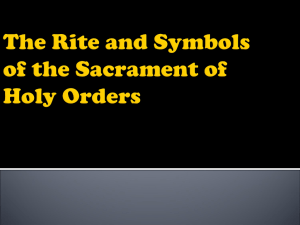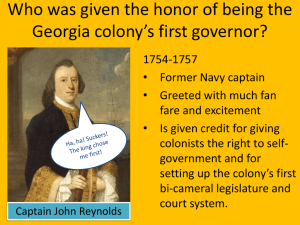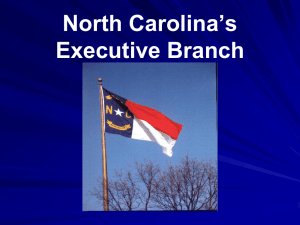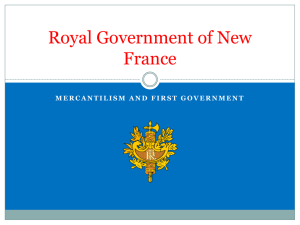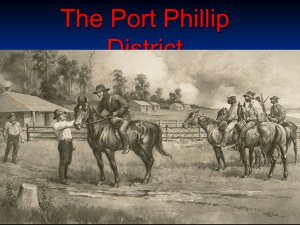Government of New France
advertisement
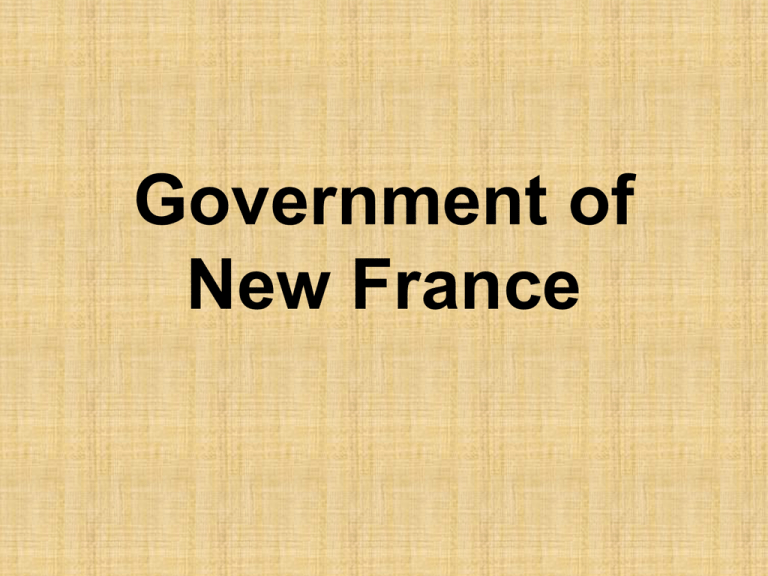
Government of New France Early New France • Governance in New France began with private companies making rules and policies for its employees. • Samuel De Champlain was the first real governor under this system Early New France • Too many different companies meant too many different rules. • 1627 – Cardinal Richelieu forms the “Comapgnie des Cents-Associés” (Company of a Hundred Associates) Company of a Hundred Associates • All the private companies were combined to form a monopoly as a chartered company. • Richelieu hoped that having one company in charge would stabilize the colony and encourage settlement • The company had administrative, judicial, and lawmaking powers. Early New France • 1645, the Company of a Hundred Associates sublet its charter to “Communauté des habitants” – another fur trading company. • Due to a vicious war with the Mohawk, this company failed as well. A Royal Province • On September 24, 1663, King Louis XIV made the colony of New France a royal province. • This meant that he (through his viceroy) would have direct control over the colony. A New System • The new structure of government for New France was largely experimental. If it worked well, it would be adopted for use in France’s other colonies. • The system was developed by Jean Baptiste Colbert – Louis XIV’s right hand man. Structure of New France Government The system of government in New France was relatively simple, with most of the power resting in the hands of only three men: the governorgeneral, the bishop and the intendant. At the top of the food chain, however, was the King of France. King Louis XIV of France 1638 - 1715 The King of France The king was the most powerful part of the French colonial government. It was believed that he ruled by DIVINE RIGHT - that he had been chosen by God to rule. As God’s representative, he had ABSOLUTE POWER. New France had a PATERNALISTIC, or Father-like form of government. The King of France Viceroy Minister of the Navy The Viceroy was a French noble who acted as the liaison between the king and the Minister of the Navy. The Viceroy did not play an active role in the government. The Minister of the Navy was a military position, and was responsible for the navy, the colonies and maritime trade. The governor of the colony answered directly to the Minister of the Navy. King of France Viceroy Minister of the Navy Governor Sovereign Council In New France a centralized government called the SOVEREIGN COUNCIL was the sole governing authority in the colony. They were the link between the king in France and the subjects in New France. The most important members of the council were the Governor, the Intendant and the Bishop, but it also included 5 councilors, an Attorney General, and a clerk. Duties of the Governor • Decided who was to become a seigneur • Collect taxes from the seigneurs • Help seigneurs with major building projects (roads, schools, etc) • Set rent limits • Settle disputes between habitants and seigneurs • Responsible for relations with the Natives • Responsible for relations with the 13 Colonies • Responsible for defence • The first governor of New France was Louis de Baude, Compte de Frontenac (or simply, Frontenac) King of France Viceroy Minister of the Navy Governor Sovereign Council Intendant Role of the Intendant • An intendant was like a business agent – he looked after all the finances and the day-to-day affairs of the colony • He was next in line after the governor. • Because he did so many things, he was considered to be the most important official in the colony Duties of the Intendant • • • • • maintaining law and order supervising the law courts and the legal system managing the economy all day-to-day administrative matters overseeing the construction and maintenance of roads • overseeing social welfare • When there was a war he arranged supplies A blue ribbon Intendant (and the first Intendant of New France) Jean Talon Talon was the first intendant of New France. His dedicated efforts helped the colony to prosper. He invested money in his brewery and iron works at St. Maurice, Quebec. He and Bishop Laval disagreed on the ethical nature of selling alcohol to the Natives in the area. Talon encouraged immigration and began a ship building industry. He established fishing and the first schools, and stream lined the judicial system. On his frequent trips around New France, Talon would encourage couples to have large families by giving them gift for marrying young or having more than 10 children. He was considered to be the model for all colonial officials to come after him. King of France Viceroy Minister of the Navy Governor Sovereign Council Intendant Bishop The role of the Bishop was in constant dispute. Politically, he was supposed to be below the governor, and roughly equal to the Intendant. This suited neither the Bishop nor the Church in Rome. As God’s representative in the colony, the Church thought that the Bishop should be the most powerful person in New France. To that end, they made the Bishop answerable to the Pope alone – elevating the Bishop’s position above that of the Governor. This, of course, did not sit well with the King – and the war was on!! The Role of the Bishop The Bishop represented the interests of the Roman Catholic Church and was nominated by the Church of France. At that point in history, the church had a great influence in the lives of the people and in the running of the government. New France’s first bishop, Bishop Laval, held the office from 1659 to 1688 and was seen as one of the most powerful people in New France. Bishop Laval greeting the Intendant Talon at Quebec, in a painting by Frank Craig. King of France Viceroy Minister of the Navy Governor Sovereign Council Intendant 5 Councillors Bishop Attorney General Clerk The Role of the People Within the Sovereign Council were five councilors who were appointed by the king from among the leading citizens of New France (usually seigneurs). There was an Attorney General who dealt with all legal matters, and there was a clerk who was responsible for all administrative duties. Regular people could petition the governor or intendant on any matter. They could hold their own meetings, run by a habitant, the captain of the militia, or the parish priest, to solve smaller problems. Overall, the people had much more freedom than farmers did in France. Overall, the people in New France seem to have been well contented with their form of government. It lasted in the colony for about 100 years during which time there was never a rebellion or, seemingly, a need for radical change. The king of France may have had absolute power, but he rarely seems to have interfered with the daily lives of the people of New France.
